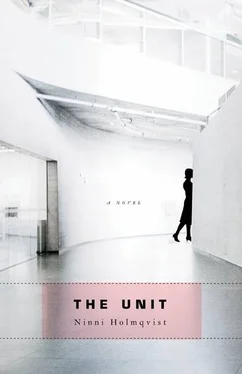There was still a minute or so before the orientation began. We went around shaking hands and introducing ourselves. Everybody looked pale and serious. Resolute. I was feeling slightly unwell and just a little bit groggy and only half awake after my unintended nap. An orderly who had been by the door welcoming us and ticking us off on a list was now standing by a table up on the podium at the front of the room, arranging some papers, a bottle of water, a bottle opener and a glass. She gave an introverted impression, as if she were shy. But if you happened to meet her eye, she smiled warmly. Her legs were disproportionately short, and she must have been seven or eight months pregnant. When she had finished arranging everything on the table, she climbed down and moved with short, waddling steps to the other end of the room. The way she walked reminded me of a penguin, which made me feel a little better, and the next time she smiled at me, I smiled back.
There was something familiar about one of the other new arrivals, a tall slender woman with high cheekbones and slanting eyes who seemed to be looking at everything around her with narrow-eyed skepticism. I recognized the girl in her through all the layers of age, but at first I couldn’t place her. When she introduced herself as Elsa Antonsson, I remembered.
“Elsa! It’s Dorrit-Dorrit Weger.”
“I can see that now,” she said, smiling tentatively. “Elementary and middle school. We were in the same class.
“Time passes…” she added slowly, in a voice that was only just holding. She was noticeably moved.
“Yes,” I said. “Time passes.”

We sat down in a semicircle facing the podium. The director of the unit was now standing behind the table, neatly and impeccably dressed in a dark maroon suit and a gray shirt. She looked at us, allowing her gaze to rest on each person in turn. Made sure she met everyone’s eyes. This made her appear extremely sincere. She smiled, unbuttoned her jacket, cleared her throat and took a deep breath, and as she breathed out she began to speak:
“My name is Petra Runhede, and I am the director here at the Second Reserve Bank Unit for biological material. First of all I want to welcome you here. I would also like to take the opportunity to congratulate you on your fiftieth or sixtieth birthdays. Congratulations! This evening we will be throwing a big party for you all. A combined welcome and birthday celebration. Everyone in the unit, residents as well as staff, is of course invited. If everyone attends there will be something in the region of three hundred people. There will be a dinner, entertainment, and dancing. Don’t miss it! Our welcome parties are usually a lot of fun! We hold one each month, as you might be able to work out. Because those of you who are here, the eight of you, have certain things in common, including the fact that you were born in the same month. You are all February children.”
Petra paused and took a sip of water.
“You all know why you’re here,” she went on, “so I won’t bore you by going through all the whys and wherefores.”
She had tilted her head slightly to one side and was smiling now, confident but still immensely engaging.
“Or to put it more accurately: you know the main reason why you are here. But there is also something more positive for you in all of this.”
She paused again, for slightly longer this time, looking at us with a serious expression.
“I have no doubt,” she said slowly, once again allowing her gaze to move from one to another, stopping briefly on each of us, “you have found that people were often unsure of you, felt nervous in your company, sometimes seemed afraid, or behaved in a condescending or scornful way. Isn’t that the case? Do you recognize that kind of situation?”
Nobody replied. There was complete silence in the room, apart from a faint hum from the air-conditioning. I was staring like an idiot at Petra, and presumably the other seven were doing the same. After a while she continued:
“Is there anyone who doesn’t recognize that situation?”
We burst out laughing, grinning at each other in embarrassment, responding to her with a mumble of denial.
“Okay,” she said, “this is what I mean. For the majority of you it isn’t until you come to the reserve bank unit that you will experience the feeling of belonging, of being part of something with other people, which those of us who are needed often take for granted. And the icing on the cake, as explained in the information packet you’ve been given, is that you need never worry about your finances again. You have food on the table, a roof over your head, free access to medical care, dental care, physical therapy and so on, and it won’t cost you a thing. You may move around freely within the unit and make use of all its facilities. There is a large winter garden here, almost a park in fact, for recreation and the enjoyment of nature. There is a library, a cinema, a theater, an art gallery, a café and a restaurant. There is a huge sports complex. And you can pursue more or less any hobby or professional activity you wish: art, crafts, electronics, mechanics, botany, architecture, acting, film, animation, you name it-there are workshops and studios for most activities. But above all”-and now she leaned forward, supporting herself on her fingertips on the edge of the table as if to give her words additional emphasis. “But above all ,” she repeated, “you have each other ! And now it’s coffee time.”

I would venture to say that this welcome speech made us all feel better about things. It would be an exaggeration to say that there was a cheerful atmosphere during the coffee break, but the deathly pallor had left most people’s faces, and as we drank coffee and ate homemade cinnamon buns in a cafélike room next door, the conversation was lively. We were starting to become interested in one another, asking questions about jobs and activities. Roy and Johanna were long-term unemployed; before that Johanna had delivered the mail and Roy had been some kind of consultant-I didn’t understand what kind. Annie had been a hotel receptionist, Fredrik a mechanic in a truck factory, Boel was a violinist and Sofia had done lots of different things, including delivering newspapers and junk mail, proofreading, cleaning in a hotel and packing goods for a mail-order company. Elsa, finally, had worked in the same shoe store ever since she finished high school.
After coffee, the meeting continued with practical information about everything from the procedures surrounding research experiments and donations to finding our way around the unit. Staff from the residential department, the health center, the surgical department, the restaurant, the art gallery, the sports center, and the podiatry and massage clinics came along, one after another, introduced themselves and told us what they did.
When we were finished my head was spinning from all the information we’d been given during the afternoon, and I had to go and lie down again for a while so I’d be able to cope with the welcome party that evening.
I remember the debate and the referendum. I also remember that it wasn’t really much of a debate to begin with, because the idea came originally from a newly formed party called the Capital Democrats, or something like that, and very few people took their proposal seriously.
I wasn’t particularly interested in politics, and I was far too young to be able to identify with concepts like middle age. Every time the topic came up, in the media or with other people, I heaved a bored sigh and turned the page or switched channels or changed the topic of conversation. Social issues of this kind just had nothing to do with me, in my opinion, and when I got pregnant by accident during the first phase of the debate, I had an abortion. I was young, after all, I was in high school, I wanted to travel, go to college, do some casual work here and there, paint, write, dance and enjoy myself. It was just as impossible to imagine myself as a mother as it was to imagine myself as middle-aged. But if I had known that at the very moment when I allowed myself to be anesthetized and scraped out I was throwing away the only chance of becoming a parent I would ever have, then things would probably not have been quite so clear cut. If I had been able to work out how things were going to be in the future, if I’d had the slightest idea, I would have given birth to my child. At least I would like to believe that’s what I would have done.
Читать дальше














